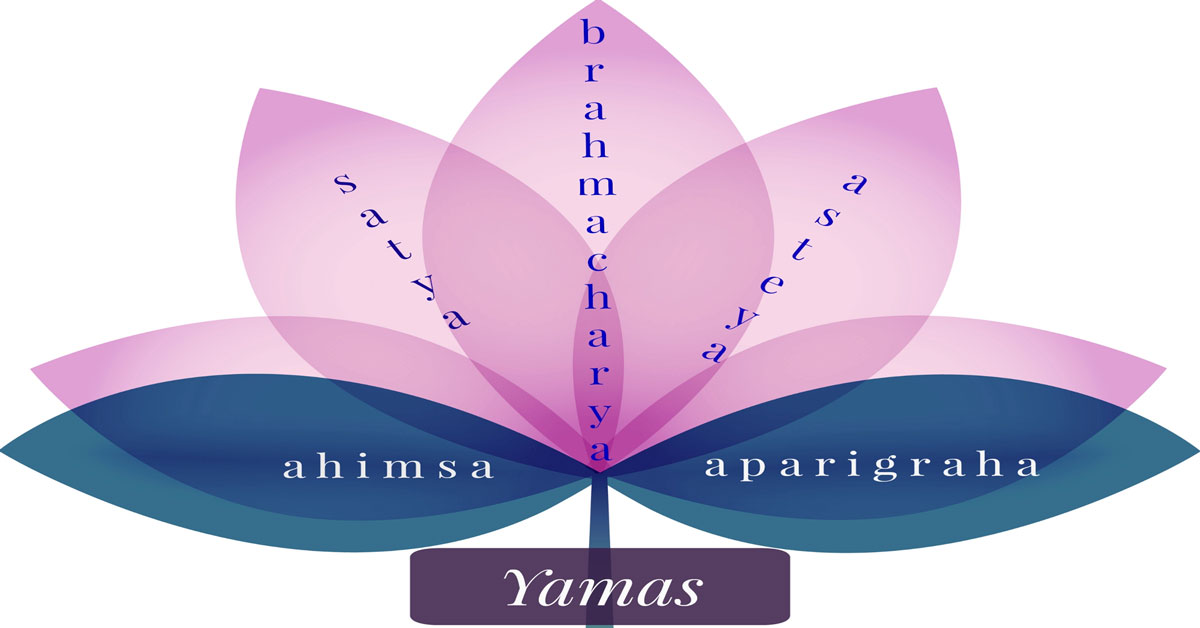The First Limb of Yoga: Yamas

The first of the 8 Limbs of Yoga are The Yamas.
The Yamas are much like the Golden Rule, doing unto others as we would have them do unto us, and they consist of five philosophies and practices:
The first is Ahimsa, non-violence or non-harming. When we practice Ahimsa, we commit to not hurting any living thing, including ourselves. Often, when people struggle with addiction, this first Yama is the one that is the most difficult to follow. Addiction not only harms those around the person who is actively using, but it first and foremost hurts the addicted individual.
The next Yama is Satya, which means truthfulness. Sometimes it is difficult to be honest with others and ourselves. When we are engaged in Satya, we do our best to take an honest look at our situations, relationships, and lives, accepting where we are in this moment. As we do this, if we are also practicing Ahimsa, we are able to look honestly at our lives with kindness and compassion.
Often translated as celibacy or sexual discipline, Brahmacharya reminds us that sexual desire and activity must be practiced within healthy boundaries. For instance, refraining from committing adultery or being promiscuous would be considered practicing Brahmacharya. Addiction often plays a role in one’s losing his or her inhibitions and in sexual infidelity and lack of control.
The next Yama is Asteya, honesty. This Yama reminds us that we need to be honest about what is ours and what is not. Asteya reminds us that we must respect other people’s boundaries, commitments, and possessions and only take what belongs to us. When people are in the depths of addiction, stealing can become part of their lives. As individuals recover and move toward more healthy lifestyles, understanding the impact stealing has on others and oneself can help reinforce the practice of this Yama.
Much like the Commandments that caution not to covet one’s neighbors’ property and relationships, Aparigraha, or generosity, reminds us to refrain from possessiveness. This is different from non-stealing because it has more to do with one’s state of mind rather than the action itself. Whenever we make bad choices in our lives, be that active or within our minds, we create an internal conflict that prevents us from realizing our potential. When we practice Aparigraha and are happy with what we have in our own lives, not looking outside ourselves for what others may have, we nurture a sense of well-being within that can help us expand and thrive.
For those who struggle with addiction, living a “right life,” one that enhances both society and the individual, can be very difficult. It is imperative that people forge new paths toward a healthy lifestyle by participating in yoga asana and meditation sessions, eating nourishing meals, and utilizing holistic counseling for themselves and their families.
Over the next few weeks, we will continue with our discussion of The Eight Limbs of Yoga. In our next installment, we will take an in-depth look at personal practices and rituals, the Niyamas.
Paradise Valley Healing Center is one of those unique places in the West that has adopted Ayurvedic principles to promote healing, self-discovery and emotional release. Many of these ancient healing methods have been incorporated into the daily program at the Center to enhance the overall well-being of our guests. Learn more about the programs we offer here.
